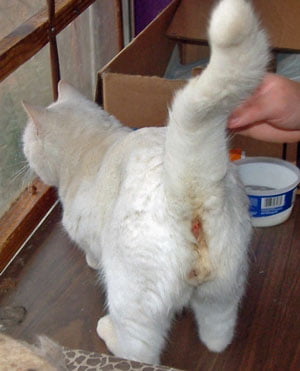
So, you’ve been a responsible cat owner and had your male cat neutered. What a lot of cat owners don’t realize is that a male cat can still be fertile up to 4-8 weeks after being neutered. Most of the sources I checked agree on the 4-6 week time frame, but Nine Mile Vets reported 8 weeks as the cutoff period for neutered male fertility1.
This information came as a surprise to me when I first learned it a few years back. I knew than men who undergo vasectomies have to be tested several weeks after surgery to be sure the sperm aren’t going to create any surprise children. I wonder how many cat owners are hit with a surprise pregnancy when their male is neutered, but they’re female cat hasn’t been spayed and is in heat?
Nine Mile vets apparently is in the United Kingdom, where it’s more discouraged than in the U.S. for young kittens to be neutered. This U.K. vet recommends four to six months of age for both male and female kittens, as do those in the U.S. The shelter my daughter and I rescued from will do a kitten as soon as it reaches three pounds in weight.
Personally, I agree with the four months being the best age. Any older and you risk the female going into heat, where she can become pregnant as young as five months old. Six months is average, but during spring mating season, or in a multicat household a cat may reach maturity at a younger age.
Not only does allowing a young cat to give birth to a litter where it will add to the overpopulation of cats, it’s quite a bit more dangerous for the mother. It’s not a good idea to allow what’s essentially a not fully developed feline to even be allowed one litter, due to the unborn kittens zapping nutrients the developing cat needs to grow strong and healthy. The pregnant queen may not survive, and her kittens may be born severely underweight or dead.
Male cat neutering is a simple surgical procedure where the testicles are removed from the body. During normal kitten development, a male kitten begins life with the testicles inside the scrotum. If both testicles haven’t descended by the time the cat is about eight months of age. A condition known as cryphorchid or monorchid refers to a cat with only one descended testicle. If neither testicle descends the medical term is bilateral cryphorchid.
These cats are usually less fertile than intact males, but they still need to be neutered. The surgical procedure will cost more since the vet has to go on a “seek and destroy” mission for the testicle(s). In a report done by U.C. Davis, cats with undescended testicles actually need neutering to prevent future health issues. These cats have a much higher risk of malignant testicular cancer than cats with their “boy parts” in the place they should be.
Please share this information with your friends who are planned to have their cat neutered. They may mistakenly believe their male cat will be unable to impregnate their female as soon as the surgery is performed. Even sites such as Yahoo and eHow have misleading information that states a neutered male is sterile immediately. Have any of the readers here ever experienced a surprise litter for this reason? Most of the people I’ve informed about this had no idea.
I’ve included a photo of how a male cat appears after neutering. There are two tiny marks where the testicles were removed. It took longer to clean the ears than to perform the procedure.


It strikes me odd that the neutered male is still fertile, even for such a short period.
Because:
When cats undergo sterilization, their bags are completely unpacked, nothing remains. When men undergo a vasectomy, they only have the tubes (vas deferens) severed. The procedure is similar to a woman having her tubes tied. The vas deferens are cut, a piece is removed, and each end is tied and sealed to prevent sperm from passing through. The testicles remain in place but are not connected to the vas deverens which prevents the sperm from leaving the body. They are eventually absorbed.
Just motivated!